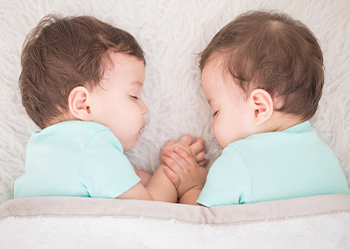University News Last updated 20 November 2024

Women are not only choosing to have children later, but they’re also more likely to have twins, according to new fertility data released by the Office for National Statistics.
According to Dr Elizabeth Bailey, multiple birth specialist at Birmingham City University (BCU), maternal age and the likelihood of having a multiple pregnancy are inextricably linked.
“More women are delaying having their first child until they’re in their 30s and 40s,” explained Dr Bailey, Associate Professor and Director of BCU’s Elizabeth Bryan Multiple Births Centre.
“Previous generations were more likely to become mothers in their early 20s, but fertility trends show that the number of 20 to 24-year-old women having children now has decreased by 79%.
“Nowadays, women are taking more time to find partners, save money, and source childcare before growing their family. The fertility rate for over 40-year-olds is not only increasing, it’s also the only age group having more babies than a decade ago – indicating that the trend is here to stay.
“This societal shift began in the 1960s. Increased sexual and reproductive rights combined with better healthcare and education to give women more opportunities for independence. This gave women choice over the timing of motherhood, and often that choice is to have children later.”
While overall fertility rates are declining in England and Wales – and have hit their lowest levels since 1977 – multiple maternity rates are 50% higher than the 1970s.
Dr Bailey believes that the rise in multiples is driven by this trend to delay motherhood, which is closely linked to the record numbers of women seeking fertility assistance.
“Women in their 40s can start to have multiple ovulations per cycle , which makes them much more likely to have a multiple pregnancy (1 in 48) than women in their 20s (1 in 2,000).
“They are also more likely to seek fertility assistance. In 2023, the number of women freezing their eggs increased by 64%, while an extra 10% opted for IVF and donors (HFEA 2023).
"Access to assisted reproductive technology (ART) led to a peak in multiple pregnancies in the 1990s – rocketing to 28%, compared to a natural multiple conception rate of 1-2%.
“This dropped down to 4% in the 2000s, following a campaign by the Human Fertilisation and Embryology Authority (HFEA) to reduce multi-embryo transfer in fertility procedures in the UK.
“However, it’s important to note that this isn't the case in other counties and could be contributing to the stability of the multiple birth rate,” added Dr Bailey.
Multiple births, which are recognised as growing globally, carry increased risks. These include higher rates of preterm birth, stillbirth, and neonatal mortality. About 60% of multiple pregnancies are preterm, leading to longer hospital stays and increased healthcare needs.
Twins are also twice as likely to be stillborn, while neonatal death rates are three times higher.
“As a result, multiple pregnancies require additional observation, which means increased antenatal appointments, scans and detailed birth planning,” noted Dr Bailey. “This can all add to the anxiety parents feel, especially if they have other young children in the family.”
As a result, Dr Bailey is calling for tailored maternity and early-years healthcare services.
“We know the early years can be challenging,” she said. “Not only do parents of multiples need additional support with practical care, such as feeding and sleep, there are also financial and emotional pressures. It costs at least £20k more to have twins than having two singletons in succession.
“Current policies often focus on single births, neglecting the specific needs of families with multiples. Specialised resources, financial support, and research inclusivity for multiple birth families are urgently needed to improve maternal and infant outcomes.
“Going forward, it’s vital that the voices of multiple birth families are heard within service design and research prioritisation as they become an ever-growing community.”
Parents of twins and multiples up to 10-years-old, including expectant parents, are invited to share their experiences and views on future research at two events run by BCU’s Elizabeth Bryan Multiple Birth Centre, taking place in Birmingham in December and Burnley in January.
Find out more details and how to book.